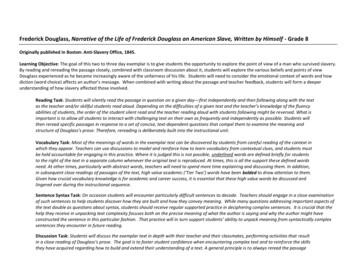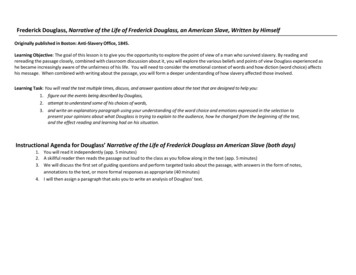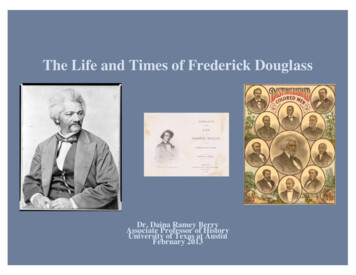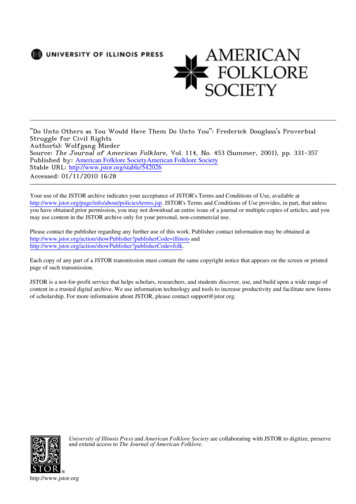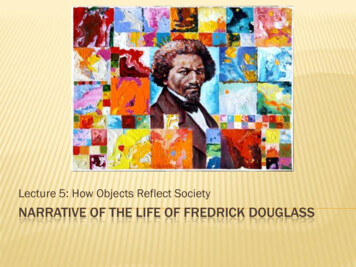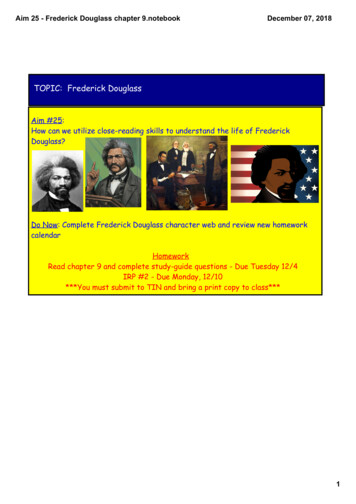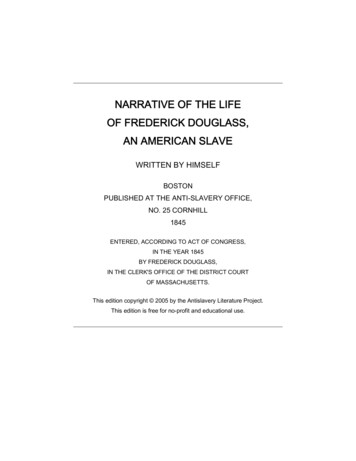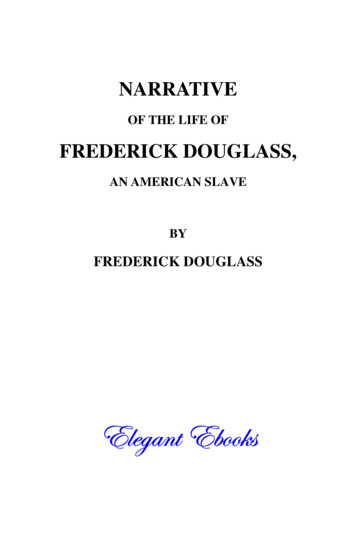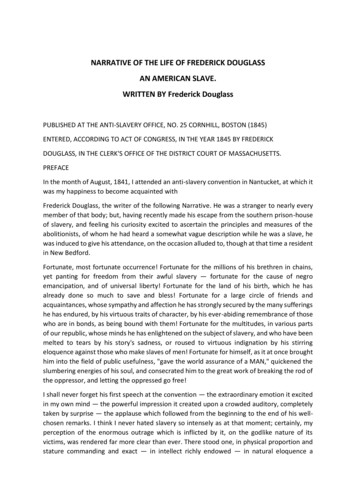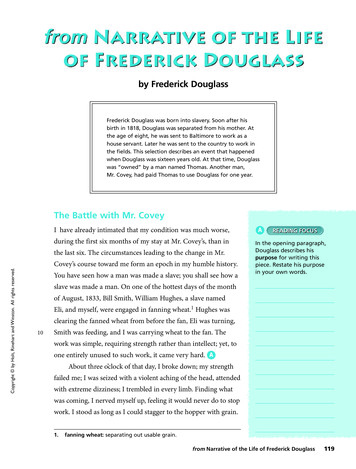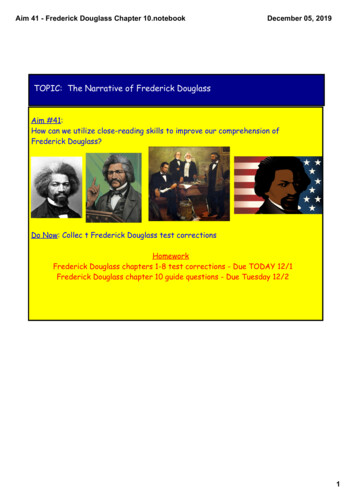
Transcription
Aim 41 Frederick Douglass Chapter 10.notebookDecember 05, 2019TOPIC: The Narrative of Frederick DouglassAim #41:How can we utilize close-reading skills to improve our comprehension ofFrederick Douglass?TOPIC: Introduction to 8th Grade Social StudiesDo Now: Collec t Frederick Douglass test correctionsHomeworkFrederick Douglass chapters 1-8 test corrections - Due TODAY 12/1Frederick Douglass chapter 10 guide questions - Due Tuesday 12/21
Aim 41 Frederick Douglass Chapter 10.notebookDecember 05, 2019Owner of the largest plantationDouglass's master/fatherCruel overseer who died suddenly"Kind overseer"Cruel overseer who killed DembyDouglass's motherDouglass's First OverseerDouglass's grandmotherKilled a house slave who did notwake quickly enough to tend to a crying babyDaughter of Colonel Lloyd;Sloop named after her2
Aim 41 Frederick Douglass Chapter 10.notebookBelieves that education will spoil a slaveDecember 05, 2019Douglass's new mistress who was kind at firstthen became cruelDouglass was responsible for watching over this "little" person in BaltimoreWhips two slaves from her chair/doesn't feed themTwo slaves whipped and starvedenoughCaptain Anthonyson who dies earlycruel son who beats Douglass's little brotherhusband/brother to Baltimore AuldDaughter/Douglass's new master3
Aim 41 Frederick Douglass Chapter 10.notebookDecember 05, 2019Douglass gave Susan B. Anthony thisphotograph of himself, taken in May1848.Stop and Jot via Chromebooks:1. Character Traits?2. Mood?3. Tone?4. Rhetorical Purpose/ Message?4
Aim 41 Frederick Douglass Chapter 10.notebookDecember 05, 2019Pair and Share(Chromebooks):1. Character Traits?2. Mood?3. Tone?4. Rhetorical Purpose/Message?5. Compare/contrasttwo portraits5
Aim 41 Frederick Douglass Chapter 10.notebookDecember 05, 20191. Character Traits?2. Mood?3. Tone?4. Rhetorical Purpose/Message?Given these photos/images, why doyou think Frederick Douglass posedfor hundreds of different portraits?What was his ultimate goal?6
Aim 41 Frederick Douglass Chapter 10.notebookDecember 05, 2019A Slave Auction in Virginia, 1861, Wood Engraving1.What do you see?2.How does this imagemake you feel?3.How might this workof art relate to current events?7
Aim 41 Frederick Douglass Chapter 10.notebookDecember 05, 2019The Africans of the Slave Ship "Wildfire,"April 30, 1860, wood engraving1.What do you see?2.How does this imagemake you feel?3.How might this work of artrelate to current events?8
Aim 41 Frederick Douglass Chapter 10.notebookDecember 05, 2019A boat packed with migrants—mostly from Eritrea and Syria—on theMediterranean1. How would you describe the conditionson this boat carrying migrants across theMediterranean?2. What do you notice about the life vests?Does this surprise you? Explain.3. What social impact does this photo have?4. What message can be learned from pasthuman rights crises?9
Aim 41 Frederick Douglass Chapter 10.notebookDecember 05, 201910
Aim 41 Frederick Douglass Chapter 10.notebookDecember 05, 201911
Aim 41 Frederick Douglass Chapter 10.notebookDecember 05, 2019TOPIC: Chapter 1 Discussion Questions - FrederickDouglass1. In what state was Douglass Born? (21)Maryland (Tuckahoe, near Hillsborough - 21 miles from easton in Talbot county.)TOPIC: Introduction to 8th Grade Social Studies2. Why didn't he know how old he was? (21)There was never an authentic record containing Douglass's birth information."Slaves know as little of their ages as horses know of theirs." (21). "I do notremember to have ever met a slave who could tell me of his birthday" (21). Thistactic was used to dehumanize slaves.3. What is Douglass's mother's name? (22)Harriet Bailey4. Who is rumored to be his father? (22)His master "My father was a white man.it was also whispered that my masterwas my father" (22).5. What happened to him before he was a year old? (22)He was separated from his mother. "Part children from their mother's at a veryearly age. Frequently, before the child has reached its twelfth month" (22).6.Why does Douglass think this was done? (22)So that the bond between mother and child will be broken and no feelings/emotions will exist. "Hinder development of the childs affection towards itsmother, and to blunt and destroy the natural affection of the mother for thechild" (22).7. How does he feel when he hears of his mother's death? (23)Douglass felt very little/almost no emotion when his mother died. ".I receivedthe tidings of her death with much the same emotions I should have probablyfelt at the death of a stranger" (23).8. Why do the slaves, who are also the children of the master, suffer more thanother slaves? (23-24)They are a constant reminder to both the master and the mistress of themasters infidelity. "the master is frequently compelled to sell this class of hisslaves out of deference to the feelings of his white wife" (24).9. Who was Captain Anthony? What kind of man is Captain Anthony? (24-25)Captain Anthony was Douglass's first master. He owned two or three farms andabout thirty slaves. "He was generally called Captain Anthony - a title which Ipresume he acquired by sailing a craft on the Chesapeake Bay" (25).10. Who was Plummer and what kind of man was he? (25)Plummer was the overseer for Captain Anthony. He was an exceptionally cruelman who would savagely beat and whip slaves. "Mr. Plummer was a miserabledrunkard, a profane swearer, and a savage monster" (25).11. Describe Aunt Hester's treatment. (25)Aunt Hester disobeyed the masters orders and was found with a young mancalled Lloyd's Ned. She was brought into the kitchen and stripped from herwaist up. Her hands were tied and arms stretched at full length so that shestood upon her toes. She was whipped with a cowskin until blood came dripping onthe floor.12. Give three (3) examples of dehumanization in this chapter. (21-27)1) Douglass has no record of his age/birthday.2) Douglass never knew his mother and was separated from her at a very youngage.3. He witnessed the humiliation and whipping of his Aunt Hester for disobeyingorders.13. Who raised Douglass and the other children? (27)His grandmother. "I had always lived with my grandmother on the outskirts ofthe plantation where she was put to raise the children of the youngerwomen" (27).12
Aim 41 Frederick Douglass Chapter 10.notebookDecember 05, 2019TOPIC: Chapter 2 Discussion Questions - FrederickDouglass1. Of whom did Douglass' masters family consist? (29)The masters TOPICtwo sons,: Introduction"Andrew and Richard;oneGradedaughter,Lucretia,and herto 8thSocialStudieshusband Captain Thomas Auld" (29).2. What were the principle products raised on the plantation? (29)Tobacco, corn, and wheat.3. Why were Peter, Isaac, Rick, and Jake envied by other slaves? (29-30)They were allowed to leave the plantation and travel to Baltimore with theirmaster. "These were esteemed very highly by the other slaves, and looked uponas the privileged ones of the plantation; to be allowed to see Baltimore" (30).4. Name two farms nearest the plantation. (30)Wye Town and New Design.5. Which of the two farms was the seat of government for the 20 farms? (30)New Design6. If a slave was convicted of a high misdemeanor, what was his/her punishment?(30)"If a slave was convicted of any high misdemeanor, became unmanageble, orevinced a determination to run away, he was brought immediately here, severelywhipped, put on board to the sloop, carried to Baltimore, and sold to AustinWoolfolk, or some other slave trader." (30).7. What other things happened at the farm? (30)Slaves from other farms received their monthly allowance of food and theiryearly clothing.8. Name the overseer of the farm. (31)Mr. Severe9. Why is his name a fitting name for him? (32)He was an extremely cruel man who whipped slaves until their blood ran downtheir backs, "a half-hour at a time" (32). He was a profane swearer who seemedto take pleasure in punishing others.10. What kind of overseer was Mr. Hopkins? (32)He was less cruel, less profane and made less noise than Mr. Severe. "Hewhipped but he seemed to take no pleasure in it. He was called by the slaves agood overseer" (32).11. What name did the slaves give the plantation? (33)The Great House Farm.12. Why didn't Douglass understand the songs sung by slaves chosen to come tothe Great House Farm on errands? (33-34)Douglass did not understand the songs sung by slaves because each song had adifferent meaning to those who were singing them. "I did not, when a slave,understand he deep meaning of those rude and apparently incoherentsongs" (34).13. How did the songs make him feel? (34)Sad and depressed. "The hearing of those wild notes always depressed my spirit,and filled me with ineffable sadness. I have frequently found myself in tearswhile hearing them" (34).14. When did the slaves sing the most? What do these songs represent? (35)slaves sang the most when they were unhappy. "Slaves sing most when they aremost unhappy. The songs of the slave represent the sorrows of his heart" (35).It may have provided a way for slaves to release their sadness and anguish.13
Aim 41 Frederick Douglass Chapter 10.notebookDecember 05, 2019TOPIC: Chapter 3 Discussion Questions - FrederickDouglass1. What was the greatest attraction at the home plantation? (37)"The garden was probably the greates attraction of the place." People came: Introductionto 8th Grade Social StudiesTOPICfrom far and nearto seeit.2. How were the slaves kept out of the garden? (37-8)Tar was put on the fence; after which if a slave was caught with any tar up on hisperson, it was proof that he/she had been in the garden. As a result, the slaveswould be whipped by the chief gardener.3. What were Colonel Lloyd's prized possessions? (38) How does his treatmentof these possessions create irony?His horses. "His horses were of the finest form and noblest blood." Thetreatment of these horses is ironic because they are treated better than mostslaves.4. How did Colonel Lloyd treat his stable keepers? (38)Extremely harsh. "They never knew when they were safe from punishment."They were frequently whipped to ensure the horses were in the best possiblecondition. "If a horse did not move fast enough.it was owing to some fault of hiskeepers" (38).5. What happened if a slave told the truth? (40) Why is this ironic?If a slave told the truth about his/her master they would usually be sent off andsold to a Georgia trader. "He was snatched away, and forever surrendered fromhis family and friends by a hand more unrelenting than death" (40).6.What does the expression, "a still tongue makes a wise head" mean? (40-1)If you suppress the truth, you will not have to face the consequences of tellingit.7. What does Douglass think of the practice of slaves fighting to defend theirslave masters' virtues? To what psychological impulse does he attribute thisresponse? (41)Douglass feels that by slaves arguing whose master was better, the greatness oftheir masters was transformed to themselves. "It was considered as being badenough to be a slave; but to be a poor man's slave was deemed to be a disgraceindeed!" (41).14
Aim 41 Frederick Douglass Chapter 10.notebookDecember 05, 2019TOPIC: Chapter 4 Discussion Questions - FrederickDouglass1. Who succeeded Mr. Hopkins? (43) What kind of man was he? (43)Mr. Austin Gore who was considered, "a first-rate overseer." "Mr. Gore was: Introductiontoartful,8th GradeSocialStudiesTOPICproud, ambitious,and persevering.He wascruel, andobdurate.He wasjust the man for such a place, and it was just the place for such a man: (43).2. If a slave was accused of a misdemeanor, what was the result? (44)They were punished (most likely whipped). "To be accussed was to be convicted,and to be convicted was to be punished" (44).3. Why did Mr. Gore kill Demby the slave? (44-45)He claimed that Demby had become unmanagable, and was setting a dangerousexample to the other slaves. "He argued that if one slave refused to becorrected and escaped with his life, the other slaves would soon copy theexample" (46).4. Give four examples of slaves being murdered without consequences to themurderer. (43-48)1) Mr. Gore killing Demby2) Mr. Thomas Lanman killing two slaves (one with a hatchet)3) The wife of Mr. Giles hicks murdered Douglass' wife's cousin when she brokeher nose and breastbone with a stick.4) An old slave who traveled onto the neighboring plantation belonging to Mr.Beal Bondly who took offence and shot him.15
Aim 41 Frederick Douglass Chapter 10.notebookDecember 05, 2019TOPIC: Chapter 5 Discussion Questions - FrederickDouglass1. Why did Douglass have so much leisure time? (49)He was not old enough to work in the field. "I was not old enough to work in the: Introductiontowork8th toGradeSocialStudiesTOPICfield, and therebeing littleelse than fielddo, I hada greatdeal ofleisure time" (49).2. Why was he so cold in the winter? Give specific details from the text. (49-50)He was kept almost naked. ".no shoes, no stockings, no jacket, no trousers,nothing on but a coarse tow linen shirt, reaching only to my knees" (49).3. Why didn't Douglass feel sad about leaving Colonel Lloyd's plantation? (50-52)He would no longer have to work on the plantation but would be working inBaltimore where he would be paid a small amount. His life could not get anyworse. "I went at it in good, earnest, working for the first time with the hopefor reward" (51).4. What does Douglass feel the move to Baltimore did for him? (53) useexamples from the text.It was the first step for Douglass to achieve his freedom. Without it, he wouldstill be confined to working in the fields. "Going to live in Baltimore laid thefoundation, and opened the gateway, to all my subsequent prosperity" (53).5. Of all the slave children that could have been picked to go to Baltimore, towhat does Douglass attribute his being picked? (53-54)Douglass attributes his being picked to God. "This good spirit was from God andto him I offer Thanksgiving and praise" (54).16
Aim 41 Frederick Douglass Chapter 10.notebookDecember 05, 2019TOPIC: Chapter 6 Discussion Questions - FrederickDouglass1. What was Douglass's new mistress like? (55-56)She was a very kind woman. (Most likely because she never had a slave under her: Introduction8thcontrol beforeTOPICDouglass)."Her face was tomadeof GradeheavenlySocialsmiles,Studiesand her voiceof tranquil music" (55). However, over time she became cruel.2. Why did Douglass learn to read? (56-57)Not only was it a prized achievement, but he knew that by learning how to read,it would eventually lead to his freedom. "From that moment, I understood thepathway from slavery to freedom" (57).3. Mr. Auld forbids his wife to teach Douglass to read. list four (4) reasons thathe gives her. (56)It was unlawful/unsafe to teach a slave to readLearning will spoil the best slave in the worldThe slave would become unmanageable and of no valueIt would make the slave discontent and unhappy4. How are slaves in the city different from slaves on the plantation? (57-58)"A city slave is almost a freeman compared to a slave on the plantation" (57).They are better fed and clothed, and enjoy privileges altogether unknown to theslaves that work on a plantation.5. Describe the cruelty of Mrs. Hamilton. (58-59)She would sit in a large chair in the middle of the room and constantly whipslaves every hour. "The head, neck, and shoulders of Mary were literally cut topieces." She also kept many of the slaves half starved.17
Aim 41 Frederick Douglass Chapter 10.notebookDecember 05, 2019TOPIC: Chapter 9 Discussion Questions - Frederick Douglass1. What were Master Thomas Auld and his wife like? (77-79)"They were well matched being equally mean and cruel." (77) For the first time,Introductiontoleading8th GradeTOPICDouglass was notgiven:enoughto eat. Thetrait ofSocialhis newStudiesmaster wasmeanness and Douglass does not know of any kind act performed by him.2. What action by slaveholders was the height of meanness? (77-78)Not giving a slave enough to eat is regarded as the most aggravated developmentof meanness among slave-holders. "A great many times we poor creatures beennearly perishing with hunger when food in abundance lay moldering in the sageand smokehouse." (78).3. What was used to justify cruelty? Give an example from the text. (80-82)Religion was used to justify cruelty. "But after his conversion, he found religioussanction and support for his slaveholding cruelty" (80).4. What did religion do to a master? (77-82)Religion justified a masters cruelty. "I have said, my master found religioussanction for his cruelty" (81).5. Who is Mr. Edward Covey (explain his circumstances and reputation)? Whywas Douglass sent to live with him for a year? (82-83)Mr. Covey was a slave breaker. Douglass was sent to him by Master Thomas inthe hopes that Douglass would be "broken" and stop being disobedient. "Mr.Covey had acquired a very high reputation for breaking young slaves, and thisreputation was of immense value to him" (82). Douglass gladly makes the changeas he hopes he will be better fed.18
Aim 41 Frederick Douglass Chapter 10.notebookDecember 05, 2019TOPIC: Chapter 10 Discussion Questions - Frederick Douglass1. What kind of job did Douglass have for the first time in his life? (85)Douglass now works as a field hand working for Mr. Covey. "I left master: Introduction8thonGradeStudiesThomas' houseTOPICand wentto live with Mr. toCoveythe 1stSocialof January,1833. Iwas now, for the first time in my life, a field hand" (85).2. What happened to Douglass after his first week with Mr. Covey? (85-87)One day, Douglass is driving a cart and loses control of the oxen. The cartoverturns, breaking a wheel and injuring the animals. From this point forwardDouglass is beaten at least once a week. "During the first six months, of thatyear, scarce a week passed without his whipping me. I was seldom free from asore back" (87).3. Mr. Covey was one of the few slaveholders who did what? (87)Mr. Covey was a hardworking man who worked alongside the other slaves. "Mr.Covey was one of the few slaveholders who could and did work with his hands. Hewas a hard-working man. He knew by himself just what a man or a boy could do.There was no deceiving him" (87).4. What did the slaves call Mr. Covey and why? (87-88)They called Mr. Covey "The Snake." "When we were at work in the cornfield, hewould sometimes crawl on his hands and knees to avoid detection, and all at oncehe would rise nearly in our midst, and scream out, Ha, ha!" (88).5. Mr. Covey believes he is a "sincere worshipper of the most high God." Explainthe irony of this based on his actions with a slave named Caroline. (89)Mr. Covey's actions are ironic because he purchased a slave named Caroline forthe sole purpose of breeding more children would equal more wealth. He hired amarried man of Mr. Samuel Harrison to live with her until she eventually gavebirth to twins. "The result was, that, at the end of the year, the miserablewoman gave birth to twins" (89).6. What does Douglass say Mr. Covey turned him into and why? (90)Mr. Covey turned Douglass into a brute because he succeeded in "breaking him.""The dark night of slavery closed in upon me; and behold a man transformed intoa brute!" (90).7. An apostrophe is a figure of speech in which an absent person, a personifiedinanimate being, or an abstraction is addressed as through present. The term isderived from a Greek word meaning "a turning away," and this sense ismaintained when a narrative or dramatic thread is broken in order to digress byspeaking directly to someone not there. Analyze the apostrophe on page 91 andexplain its meaning.Douglass compares his life to the "lives" of ships, stating that the ships are freewhile he remains a slave. The apostrophe has a tone of remorse as Douglass bidsfor his freedom. "I would pour out my souls complaint, in my rude way, with anapostrophe to the moving multitude of ships" (91).8. What did the fight with Mr. Covey do for Douglass? (98-99)It re-ignited Douglass' desire to be free. After the fight with Mr. Covey,Douglass was never whipped again. "This battle with Mr. Covey was the turningpoint in my career as a slave. It rekindled the few expiring embers of freedom,and revived within me a sense of my own manhood" (98).9. Why were the days between Christmas and New year's Day important to theslaves? (99-100)These were very special days for the slaves because they are holidays in whichslaves do not work. "The days between Christmas and New Year's day areallowed as holidays; and, accordingly, we were not required to perform any labor,more than to feed and take care of the stock" (99).10. What purpose did the holidays serve for the slaveholders? (100-102)Slaveholders used these holidays to, "disgust their slaves with freedom byplunging them into the lowest depths of dissipation" (101). For example, theslaveholders would take note of the activities the slave took part in and used itagainst them.11. How was Mr. William Freeland different from Mr. Covey? (102-103; 105-107)Mr. William Freeland wasn't rich but was described as, "an educated southerngentleman." Mr. Freeland had some regard for honor, reverence for justice, andsome respect for humanity. Douglass, "always knew where to find him" and "hemade no pretensions to, of profession of religion" which Douglass feels was agreat advantage.12. According to Douglass, who were the worst slaveholders? (103-105)Douglass feels that the worst slaveholders are the religious ones. "I have everfound them the meanest and basest, the most cruel and cowardly, of allothers" (103).13. What did Douglass resolve to do in 1835? (108)To become a free man. "I therefore resolved that 1835 should not pass withoutwitnessing an attempt, on my part, to secure my liberty" (108).14. What does the following quote mean? .rather than bear those ills we had /Than to fly to others that we knew not of." (110)"The devil you know is better that the devil you don't know." Douglass and theother slaves were fearful of escaping because of how they would be punished.They are already familiar with being punished a certain way and do not want toexperience a worse punishment.15. Why were the slaves going to take a water route as a means of escape? (110 111)They hoped that they would not be recognized as run-a-ways, but instead,fisherman. "we were less liable to be suspected as runaways; we hoped to beregarded as fisherman; whereas, if we should take the land route; we should besubjected to interruptions of most every kind" (111).16. Explain why Douglass, John, and Henry were taken to jail. (112-116)The men were taken to jail to be questioned about their alleged escape plans."We were sent off to jail at Easton.their object in separating us was to hinderconcert" (116).17. What did Douglass do with his pass? What did henry do with his? (114-115)Douglass threw his pass in the fire. Henry was told to eat his with a biscuit."Own nothing! Our confidence in each other was unshaken" (115).18. What was their greatest concern? (115)Douglass and the other men's greatest concern was about separation. "Ourgreatest concern was about separation. We dreaded that more than anythingthis side of death" (115).19. Where was Douglass sent after Capt. Auld got him out of jail? (117)He was, "sent back to Baltimore, to live again with his brother Hugh, and to learna trade" (117).20. What was the reason for the fight Douglass found himself in and whathappened to him physically? (117-121)Douglass worked alongside white carpenters who were worried that AfricanAmericans would take over their trade and replace them. They could constantlydegrade Douglass and torment him with threats. Eventually, Douglass gets into afight and as a result, he gets beat up with severe damage to his left eye. "Myeyeball seemed to have burst. When they saw my eye closed and badly swollen,they left me" (120).21. What skill did Douglass learn at the shipyard of Mr. Walter Price? (122)Douglass becomes a caulker and learned the art of using a mallet and irons. "Inthe course of one year from the time I left Mr. Gardner's, I was able tocommand the highest wages given to the most experienced caulkers" (122).22. How much money did Douglass make per day? Per week? What did he do withall his money and why? (123)Douglass gets paid 1.50 per day. Per week he makes between 6 - 7 butsometimes as little as 4. Douglass gives his money to Hugh Auld who Douglasscompares to a pirate who has a "right" to his wages. "I was compelled to deliverevery cent of that money to master Hugh.because he had the power to compelme to give it up" (123).19
Aim 41 Frederick Douglass Chapter 10.notebookDecember 05, 201920
Aim 41 Frederick Douglass Chapter 10.notebookDecember 05, 201921
AttachmentsVenn Diagram First Day Writing Sample.docx
Aim 41 Frederick Douglass Chapter 10.notebook 13 December 05, 2019 TOPIC: Introduction to 8th Grade Social Studies TOPIC: Chapter 2 Discussion Questions - Frederick Douglass 1. Of whom did Douglass' masters family consist? (29) The masters two sons, "Andrew and Richard; one daughter, Lucretia, and her husband Captain Thomas Auld" (29). 2.

